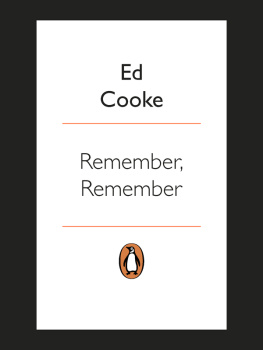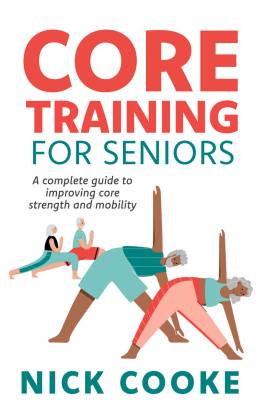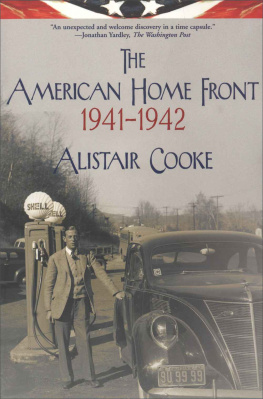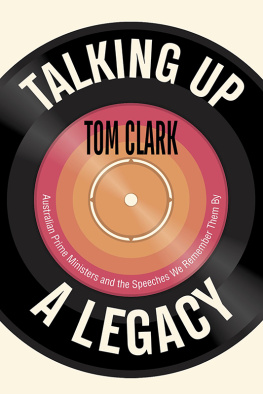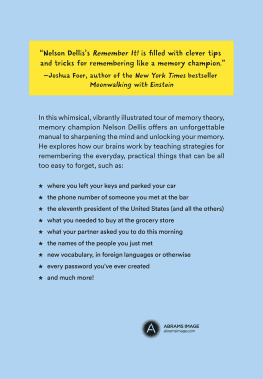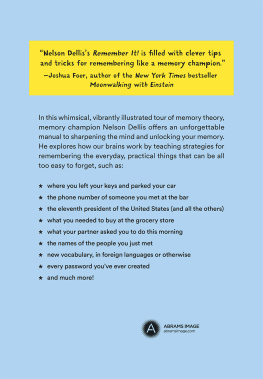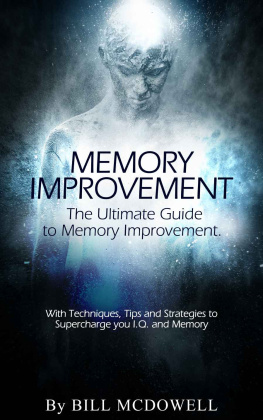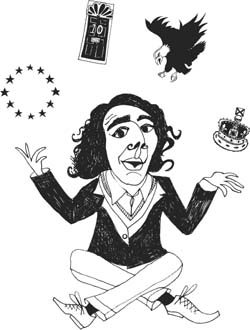Contents
Ed Cooke
REMEMBER, REMEMBER
Learn the Stuff You Thought You Never Could
Ed Cooke studied Psychology and Philosophy at Oxford University, graduating in 2004. In order to become a Grandmaster of Memory, he had to memorize 1,000 numbers in an hour, ten decks of cards in an hour (520 cards) and one deck in under two minutes. He was ranked seventh overall in the 2007 World Memory Championships, in which he has competed since 2003, and coached Josh Foer from novice to US Memory Champion in one year. As well as writing his weekly Mr Memory column in The Times, Ed teaches memory techniques and thinking skills around the UK. On most Sundays he can be found guiding memory walks around London.
To my wonderful sisters, Daisy, Eleanor, Florence and Phoebe
Introduction
Read this book, and youll be able to do some fun things.
Youll be able to recite all of our kings and queens in order, youll be able to draw a freehand map of Europe, youll be able to tell any interested parties how many presidents were called James and youll know which prime minister came before the Earl of Rosebery.
Indeed, youll know that the Earl of Rosebery was a prime minister in the first place, and also that he married an heiress and won the Derby like Edward VII, who, incidentally, was Queen Victorias eldest son.
Knowing this kind of stuff is fun, its useful and there is no need whatsoever for a gigantic brain.
If youre to believe me when I say this, and if youre to believe that by merely reading this book youll know very many things, it may be helpful if I explain a little of how this project came about.
It began with something of a personal climb-down.
You see, for some years Id been enjoying the social perks that come with being a Grandmaster of Memory: being ushered to the front of the queue at my local Tesco, receiving free bottles of champagne from unwary barmen, having my hands stroked by pretty girls with star-struck gazes.
These were obviously good times. But they were being generated by a terrible illusion. You see, my ability to learn a two-hundred digit number in the time it takes to feed a cat was causing people to overestimate the speed of my brain. People supposed that, since they could only manage about ten in a similar period, my brain travelled about twenty times faster than your standard road-going model.
Now, on numerous occasions I tried my best to explain that this was not the case. Repeatedly, I described the techniques that are entirely responsible for my capacity to remember: a wonderful collection of imaginative manoeuvres with a tradition of expert practice that stretches back millennia.
But mere explanation proved next to useless in defusing the aura of genius attached to my knowing, for instance, the address and phone number of every pizza-delivery joint in mainland Europe.
The core trouble was that you have to experience these techniques yourself before you can really trust them to work.
So I decided to actually show (forcefully, where necessary) my friends and family, and any members of the public who cared to take an interest, what was going on inside my head as I performed the memory marvels that were in danger of becoming the basis of my entire social life.
I therefore began a series of educative memory walks in London. Ten or fifteen of us would gather of an afternoon at an appointed spot, on the understanding that if, after an hour or so, those present were not able to flawlessly recite both backwards and forwards the sixty or so kings and queens of England and Britain, or whatever else was on the menu for that week (giving relevant biographical details, of course), then Id eat my hat.
Wed pick a path about some of the capitals landmarks and Id instruct my fellow walkers to imagine bizarre scenarios a bottle full of wolves at the foot of the National Portrait Gallery, a footballer in a toga against a lamp-post in Hyde Park, bowtie-wearing geese escaping from a tub of lard in Little Venice. We proceeded at a lazy pace, and there was much good-humoured banter along with the occasional high-five or boat ride.
These were memory techniques in action: ways of remembering that are kind on the mind, quickly learnt and formidably powerful. Invented by the Greeks, they were perfected in the Middle Ages and, though they still enjoy a mild renown, are ridiculously underused in the present day.
The results were most gratifying. People seemed to be enjoying themselves a good deal, and, more pertinently, I wasnt eating any hats. Recall was generally perfect, memories were still in place after many weeks and the facts learnt were regularly and effortlessly called to mind. Some of my walkers, it emerged, were even beginning to blaze ruinous trails through the pub quizzes of South London.
This is really cool, Ed, people told me. Can we learn the hundred most common varieties of cat next week? I beamed as I nodded back at them, but behind this show of pleasure and pride a niggling cluster of doubts stopped me from wholeheartedly agreeing with them that this was indeed cool.
I still privately suspected, you see, that all the things we were learning were things that normal people should know as a matter of course, that these walks were an embarrassing necessity, perhaps, for people like me who lack a thorough education, but were hardly something of general value.
This conviction lessened in power, though, as I noticed historians joining my walks. At first I thought that there must be some mistake, or that they had come to mock me, but again and again I saw these scholars of history at the back of my tour group, furtively forming the images as they followed along, all ears.
A thought as wonderful as it was appalling began to grow in my mind. Maybe no one really knows this stuff; maybe even paid-up students of history go a bit blank when you start talking about the many sons of King Aethelwulf of Wessex.
Some amateur research was merited. A short investigation ensued. This is what was found:
Oxford history undergraduates can freely name an average of only 9 of the 52 British prime ministers (thats 17%). They havent even heard of more than half of them.
Cambridge historians are even more ignorant.
Their professors are not much better.
The average pedestrian is on a yet more miserable footing.
I tried asking about our kings and queens. A slightly different, though equally bleak, picture emerged.
On hearing the combination of a common boys name and a number say, William and the fifth people recognized that it was a king I was asking about, they remembered he came from quite a while ago, they reported hearing something about him at some point, but were generally unable to provide any further detail. Was he the son of William IV? some ventured. The objectivity required for my data gathering made it impossible for me to respond, No, you idiot.

